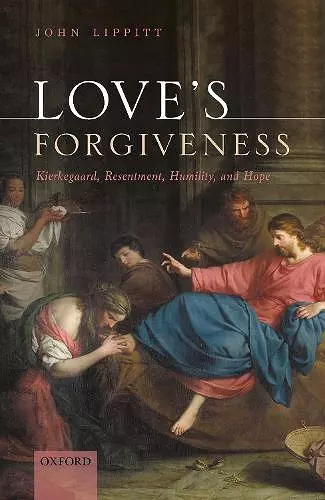Love's Forgiveness
Kierkegaard, Resentment, Humility, and Hope
Format:Hardback
Publisher:Oxford University Press
Published:24th Sep '20
Currently unavailable, and unfortunately no date known when it will be back

Love's Forgiveness combines a discussion of the nature and ethics of forgiveness with a discussion--inspired by Kierkegaard--of the implications of considering interpersonal forgiveness as a 'work of love'. It introduces the reader to some key questions that have exercised recent philosophers of forgiveness, discussing the relationship between forgiveness and an extended notion of resentment; considering whether forgiveness should be conditional or unconditional (showcasing a particular understanding of the latter); and arguing that there are legitimate forms of third party forgiveness. It then introduces the idea of forgiveness as a work of love through a discussion of Kierkegaard, key New Testament passages on forgiveness, and some contemporary work on the philosophy of love. Drawing on both philosophy and the New Testament, it offers an understanding of forgiveness that incorporates both agapic love and a proper concern for justice. John Lippitt explores religious and secular uses of key metaphors for forgiveness, and the idea of forgivingness as a character trait, suggesting that seeking to correct for various cognitive biases is key to the development of such a virtue, and connecting it to other putative virtues, such as humility and hope. Lippitt draws on both Kierkegaard's discourse literature and contemporary philosophical work on these latter characteristics, before turning to a discussion of the nature of self-forgiveness. Throughout the book, the philosophical and theological literature is rooted in a discussion of various 'forgiveness narratives', including Helen Prejean's Dead Man Walking, Thordis Elva and Tom Stranger's South of Forgiveness, and Ian McEwan's Atonement.
Love's Forgiveness is a rich, fairly comprehensive resource for thinking through the various aspects and complications of the concept of forgiveness and an excellent guide to the literature on forgiveness, including some of the most recent. One of the many merits of Lippitt's book is concreteness: the use of historical, biographical, and fictional narratives to test and refine our intuitions about forgiveness. The book is deeply informed by Lippitt's sustained and close reading of Søren Kierkegaard, in particular on the topics of love, humility, and hope...Love's Forgiveness is an impressive work of philosophical exploration. It is a compelling argument that paradigmatic forgiveness is based on the kind of love that the New Testament calls agape. * Robert C. Roberts, Faith and Philosophy *
Lippitt's book is a thoroughly researched and yet exceptionally readable account of forgiveness as situated not only in relation to the contemporary philosophical literature, but also the biblical and theological sources from which much of the debate receives its impetus. Summing Up: Highly recommended. Upper-division undergraduates through faculty. * J. A. Simmons, CHOICE *
John Lippitt's ultimate goal is to make sense of forgiveness as a "work of love", drawing usefully from Søren Kierkegaard as the primary inspiration, but also invoking some of the philosophical discussions of love. In my view, most of his analysis is spot on, and his resulting account is subtle and persuasive. His writing is accessible, the pace is steady, and the structure is very clear. All philosophers (and theologians) working on forgiveness should read this book. . . . I greatly applaud Lippitt's use of detailed examples and his resistance to tidy theories. * Christopher Cowley, International Journal of Philosophical Studies *
a most welcome and richly rewarding contribution to the study of forgiveness. * Stephen Cherry, Theology *
On the whole, Love's Forgiveness meets its high ambition. The chief reason for Lippitt's success is that he has achieved an attractive picture of forgiveness . . . a second virtue is the excellence of its scholarship on Søren Kierkegaard. . . . Particularly of note is the catalytic reaction that occurs when Lippitt's theoretical articulation of forgiveness-as-work-of-love joins together with his subtle and sensitive readings of a host of narrative material . . . a subtle yet inspiring vision of forgiveness. * Thomas J. Millay, Modern Theology *
We admire people who are forgiving - but is it always right to forgive? And who has the right to forgive anyway? Should we be more concerned about forgiving or being forgiven? And if we need to be forgiven, can we forgive ourselves? These are some of the questions addressed with clarity, honesty, and a sense for the fine grain of moral arguments in John Lippitt's new book, which also does good service in showing how much we can learn from Kierkegaard's best insights on this topic. * George Pattison, Professor of Theology and Modern European Thought, University of Glasgow *
A sophisticated and original exploration of the idea of forgiveness, grounded in, but not exclusively centred on, the work of Kierkegaard. The book is wide-ranging in topics covered and scope of reference, rich in argument and analysis, sympathetic and nuanced in its treatment of the subject, and well-informed in the theological, psychological, and philosophical contexts of debate. * Peter Lamarque, Professor of Philosophy, University of York *
A masterful treatment of an exceptionally important set of issues surrounding forgiveness. It will become the standard work on forgiveness, and it also has lots to offer about love, justice, and the virtues of hope and humility. * C. Stephen Evans, Professor of Philosophy and Humanities, Baylor University *
ISBN: 9780198861836
Dimensions: 236mm x 163mm x 20mm
Weight: 508g
254 pages